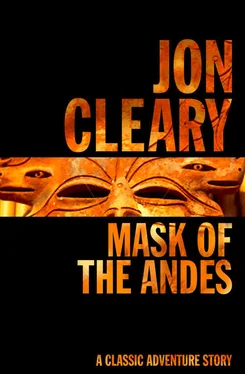Jon Cleary - Mask of the Andes
Здесь есть возможность читать онлайн «Jon Cleary - Mask of the Andes» — ознакомительный отрывок электронной книги совершенно бесплатно, а после прочтения отрывка купить полную версию. В некоторых случаях можно слушать аудио, скачать через торрент в формате fb2 и присутствует краткое содержание. Жанр: unrecognised, на английском языке. Описание произведения, (предисловие) а так же отзывы посетителей доступны на портале библиотеки ЛибКат.
- Название:Mask of the Andes
- Автор:
- Жанр:
- Год:неизвестен
- ISBN:нет данных
- Рейтинг книги:5 / 5. Голосов: 1
-
Избранное:Добавить в избранное
- Отзывы:
-
Ваша оценка:
- 100
- 1
- 2
- 3
- 4
- 5
Mask of the Andes: краткое содержание, описание и аннотация
Предлагаем к чтению аннотацию, описание, краткое содержание или предисловие (зависит от того, что написал сам автор книги «Mask of the Andes»). Если вы не нашли необходимую информацию о книге — напишите в комментариях, мы постараемся отыскать её.
Mask of the Andes — читать онлайн ознакомительный отрывок
Ниже представлен текст книги, разбитый по страницам. Система сохранения места последней прочитанной страницы, позволяет с удобством читать онлайн бесплатно книгу «Mask of the Andes», без необходимости каждый раз заново искать на чём Вы остановились. Поставьте закладку, и сможете в любой момент перейти на страницу, на которой закончили чтение.
Интервал:
Закладка:
McKenna went out of the room and Bishop Ruiz returned to his chair. He picked up The Wall Street Journal , but he was reading a foreign language, one that suddenly, if only temporarily, he did not feel comfortable with. He dropped the newspaper back on the desk and sat staring across the room. He reached across, took a cigar from a tooled leather box, lit it and sat back again. His purple biretta rested on one corner of the desk and he picked it up and examined it as a mining engineer might examine a piece of quartz. Is that what I have spent my life working for?
Or had he worked for it? The second son of the Ruiz had always been meant for the Church. It had been that way for generations; one or two second sons had rebelled, but the family had fixed that: they had been banished and the third sons had taken their places. The succession had been as ordained as that in a royal family: the eldest son to run the estates, the second son to enter the Church, the other sons to stand by in case of replacement: just like a royal family or a football team, the Bishop mused. It had not been a difficult life in the priesthood; no Ruiz could be expected to take vows of poverty so none was ever expected to join an ascetic order unless he wished to. Sometimes the Bishop, a naturally sensual man, had regretted the absence of women in his life; but then he consoled himself that, had he been permitted a wife, he might have made a bad choice. All the prayers in the world could not guarantee a good wife; woman was God’s best joke on man. He saw that every time he went to his brother’s house. Alejandro, who thought of himself as a king, was mocked by his queen; Romola was her husband’s purgatory here on earth and she enjoyed every minute of her punishment of him. The Lord had at least protected the Bishop from someone like her.
He swung his chair round, looked out the window. The young American priest was just getting into his Jeep; a young bootblack rushed at him, but McKenna brusquely waved him away. The young man was angry. And I am responsible, thought the Bishop. But what else could I do? The world, our world, does need changing; who knows that better than I? Some day the campesinos will rise up and cut all our throats, even mine or anyway that of one of my successors; the purple biretta won’t be a protection, only a target. We shall be killed because we are Ruiz; if not Alejandro and I, then Francisco and his brother Jorge now in the seminary up at La Paz. Time is running out for us.
Cigar ash fell on his soutane and he fastidiously brushed it off. He swung his chair round and looked back into the room. It was a room that suggested luxury, one that would not have been out of place in the Ruiz family mansion; he never made the mistake of receiving any of the campesinos or any of the Leftist government officials here. But it typified him, he knew: he was a lover of the good life, of privilege and the past: he was a Ruiz. And that is why, even though I think he may have the right approach, I cannot condone what McKenna has done. It is too late: I am too soft, corrupt, if you like, to join the protestors; old men do not make good revolutionaries. I am not old in years, it is true; but like Alejandro I am old in my ways, trapped by history. All I can do is pray that God forgives the reactionaries of the world.
There was a knock on his door and his secretary, a small, thin mestizo priest, older than himself, came in. ‘Senor Obermaier is here to see you, your grace.’
The ex-Nazi: now there was a real reactionary, one through conviction, not through laziness. The Bishop sat up, feeling a little less condemned. He put out his cigar, straightened his soutane. Though he did not like Karl Obermaier, he was easy to talk to: he was another man who lived in the past.
‘Show Senor Obermaier in. And bring us some wine. The Niersteiner would be appropriate, I think.’
Chapter Two
1
The driver pulled up the Land-Rover outside the railway station and Taber and Pereira got out. A blind Indian woman, led by a small girl, came shuffling towards them; the child guided the claw of a hand up to the coin that Pereira dropped into it. A policeman, dark eyes blank under the stiff vertical peak of his cap that seemed to be an extension of the planes of his face, stood by the kerb but made no attempt to move the beggar woman on. He was an Indian, too: criollos and gringos were fair game.
‘Begging is against the law,’ said Pereira as he and Taber went on into the big deserted hall of the station. ‘But no one ever takes any notice of it, least of all the minions of the law.’
Miguel Pereira was a chubby little man in his mid-thirties with a handlebar moustache, bad breath that he constantly sweetened with mints, and a vocabulary derived from a library of Victorian English novels. He had graduated as an agronomist from the University of San Marcos in Lima, then had had an extra year at Texas A & M on an American grant. He had come back to San Sebastian, married a local girl and now had four children and two jobs. He was the government agricultural adviser and, under a pseudonym that everyone knew of, he also managed the largest cinema in town.
‘It is the only way one can survive,’ he had told Taber when the latter had arrived a week ago. ‘The government does not reward its devoted minions. I grew up as a child expecting a life of comfort – my family were of wealthy means. But we lost all that in the revolution – we were not as fortunate as some people. I was suddenly thrown on the world—’ He had spread dramatic hands; Taber listened for violins, but heard none. ‘When one is born with a silver spoon in one’s mouth, one finds it difficult to adapt to a life of penury. Luxury is in the blood, don’t you think?’
‘I couldn’t say,’ said Taber mildly. ‘It’s quite a while since I’ve had a blood test.’
‘A sense of humour!’ Pereira clapped his hands together as if Taber had just announced a World Bank grant for penurious agronomists. ‘The sign of an educated man. We are going to be very amicable colleagues, Senor Taber. You will be my guest any night you wish at the cinema. Tonight, perhaps? We are showing Rosemary’s Baby , a jolly comedy about witchcraft in New York. The campesinos will love it, though they may find it a little unsophisticated.’
‘Some other time. I like Westerns.’
‘Who doesn’t?’ Pereira put his hands on his plump hips as if he were about to draw six-guns. ‘John Wayne. The campesinos flock to see his movies. They are waiting for the one where he is shot in the back by an Indian or a Mexican bandit. I await with dread the night it happens. They will burn down the cinema in celebration.’
Now, in the station, he said, ‘This way to the Customs chief. His name is Suarez – he is a very difficult man.’
‘They always are,’ said Taber, with memories of other Customs chiefs in a dozen other countries. ‘It’s in their blood.’
‘A sense of humour!’ Pereira burbled admiringly. ‘How it makes life bearable!’
Their footsteps echoing hollowly on the stone floor, they walked across the wide main hall. Only four trains a week now arrived at and departed from San Sebastian; the station was a monument from and to the past; it had been superseded by the still half-constructed airport terminal up on the altiplano. Birds flew in and out through the upper reaches of the high domed roof, the only arrivals and departures for today. From the hall Taber could see the empty platforms stretching away down towards the marshalling yards, currents of rust showing clearly in the river of rails. In the yards two ancient engines, British made at the turn of the century, shunted some equally ancient wagons back and forth as if the drivers were intent only on keeping the stock rolling, otherwise they would be out of a job. I’m in another museum, Taber thought.
Читать дальшеИнтервал:
Закладка:
Похожие книги на «Mask of the Andes»
Представляем Вашему вниманию похожие книги на «Mask of the Andes» списком для выбора. Мы отобрали схожую по названию и смыслу литературу в надежде предоставить читателям больше вариантов отыскать новые, интересные, ещё непрочитанные произведения.
Обсуждение, отзывы о книге «Mask of the Andes» и просто собственные мнения читателей. Оставьте ваши комментарии, напишите, что Вы думаете о произведении, его смысле или главных героях. Укажите что конкретно понравилось, а что нет, и почему Вы так считаете.












